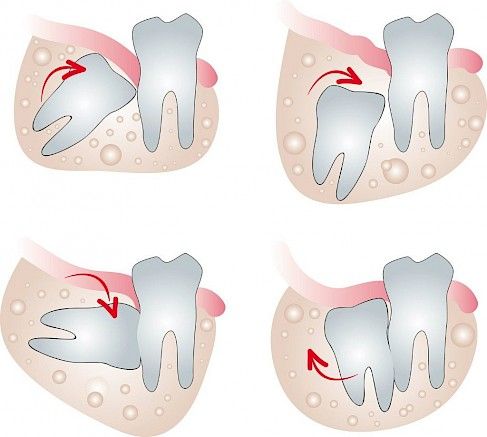Is It Wise To Remove The Wisdom Teeth?
Is It Wise To Remove The Wisdom Teeth?
The wisdom teeth grow at the back of your gums and are the last teeth to come through. Most people have four wisdom teeth – one in each corner. Your wisdom teeth don't usually need to be removed if they aren't causing any problems. This is because there's no proven benefit of doing this and it carries the risk of complications. Sometimes, wisdom teeth that have become impacted or haven't fully broken through the surface of the gum can cause dental problems. Food and bacteria can get trapped around the edge of the wisdom teeth, causing a build-up plaque. Most problems with wisdom teeth develop between the ages of 15 and 25. If you are older than age 30, you have only a small risk of having problems with your wisdom teeth. Few people older than 30 develop problems that require removal of their wisdom teeth.
The dentist can decide to extract the wisdom tooth to correct an actual problem or to prevent problems that may come up in the future.

Some of the problems that can occur with wisdom teeth are:
- Wisdom teeth usually grow through the gums during the late teens. By this time, the other 28 adult teeth are usually in place, so there isn't always enough room in the mouth for the wisdom teeth to grow properly. Your jaw may not be large enough for them, and they may become impactedand unable to break through your gums.
- Your wisdom teeth may break partway through your gums, causing a flap of gum tissue to grow over them. Food and germs can get trapped under the flap and cause your gums to become red, swollen, and painful.
- More serious problems can develop from impacted teeth, such as infection, damage to other teeth and bone, or a cyst.
- One or more of your wisdom teeth may come in at an awkward angle, with the top of the tooth facing forward, backward, or to either side.
If your wisdom teeth are not causing problems, it may be difficult to decide whether to have these teeth removed to prevent possible dental problems later in life. You may never have any problems with your wisdom teeth. In younger people (late teens and early 20s), the wisdom tooth's roots are not fully developed and the jaw bone is not as dense, so it is easier to remove the tooth. The easier it is to remove the tooth, the easier your recovery is likely to be. But if you have a medical condition that may get worse over time and your teeth may cause problems, consider having your wisdom teeth removed while you are healthy.
 TR
TR